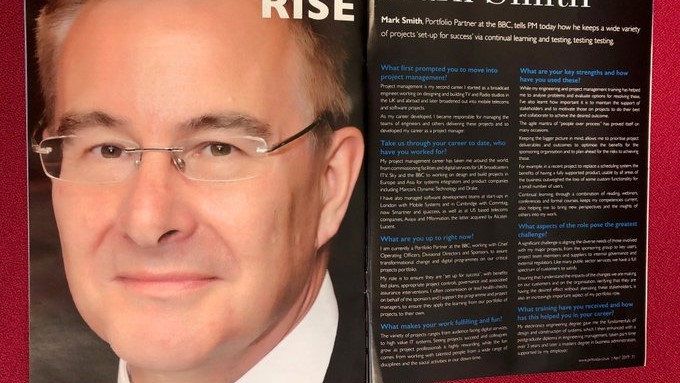High Rise: Mark Smith

Mark Smith, Portfolio Partner at the BBC, tells PM today how he keeps a wide variety of projects ‘set-up for success’ via continual learning and testing, testing testing.
What first prompted you to move into project management?
Project management is my second career. I started as a broadcast engineer, working on designing and building TV and Radio studios in the UK and abroad and later broadened out into mobile telecoms and software projects.
As my career developed, I became responsible for managing the teams of engineers and others delivering these projects and so developed my career as a project manager.
Take us through your career do date, who have you worked for?
My project management career has taken me around the world, from commissioning facilities and digital services for UK broadcasters ITV, Sky and the BBC to working on design and build projects in Europe and Asia for systems integrators and product companies including Marconi, Dynamic Technology and Drake.
I have also managed software development teams at start-ups in London with Mobile Systems and in Cambridge with Commtag, now Smartner and ip.access, as well as at US based telecoms companies, Avaya and Mformation, the latter acquired by Alcatel-Lucent.
What are you up to right now?
I am currently a Portfolio Partner at the BBC, working with Chief Operating Officers, Divisional Directors and Sponsors, to assure transformational change and digital programmes on our critical projects portfolio.
My role is to ensure they are “set up for success”, with benefits led plans, appropriate project controls, governance and associated assurance interventions. I often commission or lead health-checks on behalf of the sponsors and I support the programme and project managers, to ensure they apply the learning from our portfolio of projects, to their own.
What makes your work fulfilling and fun?
The variety of projects ranges from audience facing digital services, to high value IT systems. Seeing projects succeed and colleagues grow as project professionals is highly rewarding, while the fun comes from working with talented people from a wide range of disciplines and the social activities in our down-time.
What are your key strengths and how have you used these?
While my engineering and project management training has helped me to analyse problems and evaluate options for resolving these, I’ve also learnt how important it is to maintain the support of stakeholders and to motivate those on projects to do their best and collaborate to achieve the desired outcome.
The agile mantra of “people over process” has proved itself on many occasions.
Keeping the bigger picture in mind, allows me to prioritise project deliverables and outcomes to optimise the benefits for the sponsoring organisation and to plan ahead for the risks to achieving these.
For example, in a recent project to replace a scheduling system, the benefits of having a fully supported product, usable by all areas of the business outweighed the loss of some custom functionality for a small number of users.
Continual learning, through a combination of reading, webinars, conferences and formal courses, keeps my competencies current, also helping me to bring new perspectives and the insights of others into my work.
What aspects of the role pose the greatest challenge?
A significant challenge is aligning the diverse needs of those involved with my major projects, from the sponsoring group to key users, project team members and suppliers to internal governance and external regulators. Like many public sector services, we have a full spectrum of customers to satisfy.
Ensuring that I understand the impacts of the changes we are making on our customers and on the organisation, verifying that they are having the desired effect without alienating these stakeholders, is also an increasingly important aspect of my portfolio role.
What training have you received and how has this helped you in your career?
My electronics engineering degree gave me the fundamentals of design and construction of systems, which I then enhanced with a postgraduate diploma in engineering management, taken part-time over 3 years and later a masters degree in business administration, supported by my employer.
These taught me how to apply the general methods of project management and leadership in a wider business context, which was crucial to the more strategic projects I went on to lead.
I also undertook courses in programme, benefits and change management alongside assurance of portfolios which provided specific methods for my role running programmes and portfolio offices.
More recently, I have achieved the Association for Project Management’s Registered Project Professional and late last year became one of the very first cohort of APM’s Chartered Project Professionals (ChPP). This has raised my profile amongst my professional peers, with the recognition that I have achieved a level of competence in both knowledge and practice.
What characteristics and skills do you think make a great project manager?
When I reflect on those I have worked with who have been successful, there are three traits that stand out.
The first is the ability to inspire others to commit to a project’s vision and goals and to work collaboratively with those around them, to achieve these.
Secondly is their willingness to see their project from the perspective of staff and stakeholders, before putting forward their own view point and objectives. Those with this kind of empathy manage to overcome initial objections and win over the hearts and minds of their critical stakeholders.
Thirdly, while competence in project methods is necessary, those with a willingness to learn from others, resilience in dealing with set-backs and adapt their way of working to changing circumstances, seem to perform the best.
What are the biggest mistakes have you made and how did you correct them?
More than once have I learnt a painful lesson in the complexities of software systems and the consequences of allowing testing time to be squeezed by design and build over-runs. My experience has taught me not only to schedule end to end testing of complex systems at the earliest opportunity, but also to ensure that sub-contracted systems suppliers do the same, especially where leading edge technology is being deployed at scale, for the first time.
Which project are you most proud of?
The most exciting and impactful programme I’ve managed was the BBC’s on-line coverage of the London 2012 Olympic Games. Like the live coverage of the 1948 Olympics in London and colour TV telecasting at the Tokyo Olympics in 1964, this was a showcase for digital coverage on phones, tablets and TV’s.
My programme’s goal was to ensure that our audience would “never miss a moment” wherever they were and my challenge was to lead a team of 150 who would make this happen.
This involved taking the video and audio from the Olympic Park in Stratford and other venues, to TV Centre in West London, encoding and sending it to the BBC’s new sports studios in Salford, where it was scheduled onto 24 live channels, with an intelligent player allowing the audience to watch live or in catch-up, their favourite teams and athletes.
We also had to produce 45,000 web pages with 10,000 athlete profiles, their latest news and results, which required the use of automated page creation using dynamic semantic publishing and re-design of the BBC Sports website.
Alongside these technical challenges, my project management challenges in the busy year up to the Games, with mayoral elections, followed by the Diamond Jubilee and Euro football tournament, included: recruiting teams in London, Salford and Bristol; combining the deliverables of IT systems, managed as waterfall projects, alongside agile software development and providing seamless coverage to an audience of millions, against an un-missable deadline.
What elements make your PM life easier (good comms channels, management, software etc)?
Digital tools which allow us to meet and work collaboratively, from any location, make managing diverse teams so much easier these days and support the agile approach, but the most important factor is working with the talented project managers and committed project sponsors.
Do you have a role model?
I have been lucky enough to work with managers and business owners who have both inspired and supported me during my career. One of them, Mo Ibrahim, CEO at Mobile Systems International, created this company from scratch, based on his own research into mobile telecoms, built it into a billion pound enterprise and rewarded his staff accordingly.
He went on to create the Mo Ibrahim Prize for Achievement in African Leadership and was once said to be the “most powerful black man in Britain”.
Does being a good project manager help you in other aspects of your life?
I’m probably guilty of over-planning, but I do think through the “why” before the “what” and “how” when embarking on a DIY project at home, which perhaps explains why many ideas remain just that!
How would you like your career to progress from here?
Alongside assuring strategically important projects, I am interested in developing others, through acting as a role model, mentoring and sharing my expertise across the BBC and the project management profession.
What’s your best advice for people hoping to move up the career ladder?
I would encourage anyone who wants to make a career in project management to take every opportunity to lead and take responsibility for the outcome of the work they are involved in and thereby learn from their mistakes early on.
Also to consider the achievement of the Chartered Project Professional standard as a milestone to work towards in the early to mid-careers. This should be planned like any other project, with intermediate milestones such as training courses, increasingly demanding projects and reviews to keep their personal development as project professionals on track.




